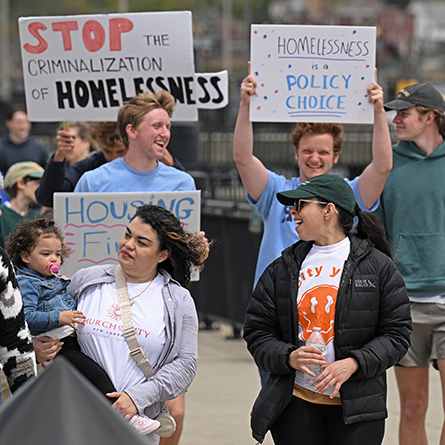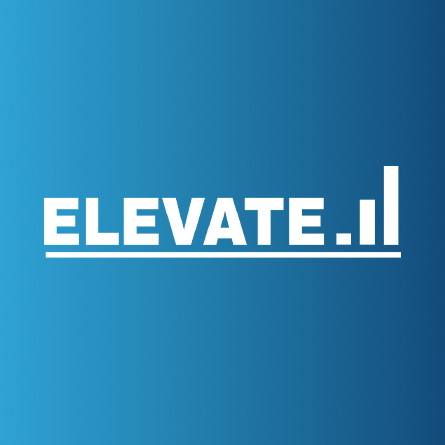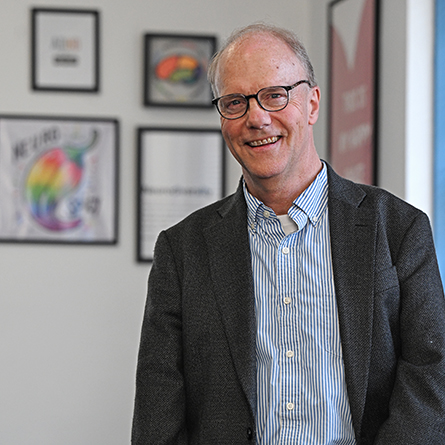
Elevate
Conn hosts inaugural social justice conference
Poet Kate Rushin has “had enough.”
Reading from her poem, “The Bridge,” during the opening assembly at “Elevate: The Inaugural Social Justice Conference at Connecticut College,” Rushin recited, “I’ve had enough / I’m sick of seeing and touching / Both sides of things / Sick of being the damn bridge for everybody / Nobody / Can talk to anybody / Without me Right?”
Presented by The Agnes Gund ’60 Dialogue Project, Elevate brought together Connecticut College students, staff, faculty and alumni, along with residents of the New London region, to celebrate cultural diversity. The conference, which featured more than 40 speakers, was designed as a space of empowerment for people who have felt marginalized, erased or silenced because of their social identities or personal backgrounds.
To empower the marginalized, avenues of communication must be opened so the speaker in Rushin’s poem no longer needs to be the bridge to communities of color.
“Our mission at Connecticut College is to create productive citizens prepared to put their education into action in support of global democracy,” said President Katherine Bergeron, who also spoke at the opening assembly.
“That means working to elevate our discourse, our practices, and our forms of self-governance to create the kind of environment where all people, no matter their identity or background, have the opportunity to thrive, to reach their potential, to contribute meaningfully to their community and the world.
“That ideal, which we call full participation, lies at the heart of who we are and what we do.”
Dean of Institutional Equity and Inclusion John McKnight, who directs The Dialogue Project and organized Elevate, said that we all need to learn to better communicate with one another to achieve “deeper levels of compassion, empathy and human connection.
“Elevate was built on the principle of full participation,” said McKnight, who delivered Conn’s land acknowledgement at the opening assembly.
“But in order for everyone to thrive, we acknowledge that we must continually work to create the conditions for all members of our community to feel respected, connected and empowered.”
The two-day conference featured author, educator and interfaith leader Eboo Patel, who spoke on campus in 2017 as part of The President’s Distinguished Lecture Series; author and community organizer Charlene Carruthers; filmmaker Shalini Kantayya; and neurodiverse writer and activist Jonathan Mooney. More than 400 people participated.
For more than 15 years, Patel has worked with governments, social sector organizations, and colleges and universities to help make interfaith cooperation a social norm. He delivered the Dr. Martin Luther King Memorial Lecture on the subject of spirituality and social movements, focusing on the idea of generosity as an agent of social change.
Patel challenged us to imagine a level of generosity that could surprise even ourselves, a kind of generosity that can “change everything for the better,” and he related stories about King, Ghandi, Nelson Mandela, Ella Baker, Diane Nash and Jane Addams to illustrate his point.
He went on to tell the audience, “One of the wonderful things about being at a place like Connecticut College or in a city like New London is that all around you there are people waiting to help you create those spaces, waiting to help you create campus community programs, waiting to help you create new types of interfaith activities.
“Now is the time to expand the circle of the beloved community,” he said.
To be successful at this task, social justice activists must be unapologetic about not only what they stand against, but also what they stand for. Naomi Miller ’22 picked up on this theme in her introduction of Carruthers as the keynote speaker: “What world do we truly envision? When will we get there? How will we actually practice our collective liberation?” she asked.
Carruthers began her talk by reading from her book, Unapologetic: A Black, Queer and Feminist Mandate for Radical Movements, and posed the five questions that all activists needed to grapple with before beginning to organize and build a coalition: “Who am I? Who are my people? What do we want? What are we building? Are we ready to win?”
These questions cannot be answered, Carruthers went on to argue, nor can complete solutions be imagined, until Americans tell the whole story of our collective past.
“When we tell more complete stories about what has happened to us, to our people, to our ancestors, we are in a better position to craft more complete solutions,” Carruthers said.
“Incomplete stories lead to incomplete solutions. And we have to do the business of telling more complete stories about the history and the current conditions within this nation, which continues to be a project of settler colonialism; which continues to be a project of capitalism, of anti-blackness, of white supremacy and patriarchy.”
She talked about how voting is only one part of a broader effort to achieve equality and liberation, and about how we all have a role to play in achieving dignity for everybody.
Carruthers called for a world where conflict, harm and violence are addressed without “policing, without prisons, without punishment, without surveillance.”
The conference included research presentations, performances, and interactive workshops and roundtable discussions like “Diversity, Equity and Inclusion Professionals,” hosted by Jonathan McBride ’92, a member of the College’s Board of Trustees; Erica Lovett ’14; Liza Talusan ’97; and Frank Tuitt ’87; and moderated by Ebony Manning ’98 and Maurice Tiner ’17.
Elevate also showcased film screenings: Virtually Free by André Robert Lee ’93, a beautiful documentary about the fight to liberate incarcerated youth through art in Richmond, Virginia, and Coded Bias, by Shalini Kantayya, a film that screened at the 2020 Sundance Film Festival. Coded Bias explores the research of Joy Buolamwini of the MIT Media Lab, and her discovery that facial recognition technology has been designed in such a way as to be blind to dark-skinned faces. The film argues that while we continue to perceive machines as neutral actors, the artificial intelligence that makes these machines learn has been encoded with bias. And it is this machine learning that is now being used in hiring and law enforcement, perpetuating white supremacy.
Kantayya, the film’s director, pointed out that this current epoch in our history is providing us with a moon-shot moment to alter our future by pushing for ethics in our technology.
“Our greatest enemy is not actually tech companies. The tech companies can partner in this work. I think the greatest enemy is our own apathy. But we have amazing power to make change right now.”
Elevate concluded with a plenary session led by Mooney, the neurodiverse writer and activist, who spoke about his challenges as a student growing up with ADHD, dyslexia and other learning disabilities. He said that he had teachers and family members who told him he’d never hold a job or graduate high school, and would probably end up in prison.
“Opposed to being a high-school dropout, I became a college graduate,” Mooney said. “Opposed to being unemployed, I ended up writing books. And, opposed to being an inmate, I became an advocate—somebody who has dedicated his entire professional life to fighting for folks who learn differently.”
In his first book, The Short Bus: A Journey Beyond Normal, Mooney traveled around the country and wrote about people like himself who are “forced to create new ways of living in order to survive.” In his latest book, Normal Sucks: How to Live, Learn, and Thrive, Outside the Lines, Mooney offers the radical message that we should stop trying to fix people and start empowering them to succeed.
“Traditionally, a ‘normal’ person has been seen as a white, affluent, able-bodied man. That definition of normality has marginalized so many and created a cultural narrative that we value normal over different. It sends a message to human beings who are different that they are deficient or that they are a problem.
“It is imperative that we challenge that model. For folks with different brains and bodies, the problem isn’t in them. The problem is in the environment around them.”
Recordings of most presentations will be available on the Elevate homepage the week of Feb. 1.

